| take courses at the School of
Engineering at HBI North Carolina A&T University ( NCA&T) and be
able to work on collaborative projects with faculty in the
School of Engineering . |
|
UNC Board of Governors
wasn't writing on a Clean sheet paper with Nanotechnology |
 NC
A&T is "well known in areas such as advanced
materials,
nanotechnology,
computational science, and says N.
Radhakrishnan, former for research and economic
development at N.C. A&T. The school also has
significant strengths in other areas, including
biotechnology, energy and the environment,
information
sciences and
technology, logistics and transportation
development. All these endeavors are
aligned in eight research clusters that bring
faculty together across disciplines to
develop
large research projects.
These research clusters run
in NC
A&T is "well known in areas such as advanced
materials,
nanotechnology,
computational science, and says N.
Radhakrishnan, former for research and economic
development at N.C. A&T. The school also has
significant strengths in other areas, including
biotechnology, energy and the environment,
information
sciences and
technology, logistics and transportation
development. All these endeavors are
aligned in eight research clusters that bring
faculty together across disciplines to
develop
large research projects.
These research clusters run
in |
|
|
parallel with a number of
multidisciplinary centers and institutes at
N.C. A&T, which develop partnerships
with
private and
corporate
sponsors, educational institutions, and
government agencies. [3]
|
|
|
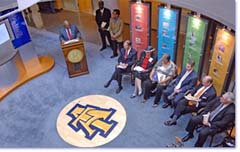 N.C.
A&T Awarded NSF Engineering Research Center
- Shena
Crittendon N.C.
A&T Awarded NSF Engineering Research Center
- Shena
Crittendon
North Carolina A&T State University has been
awarded a grant for an Engineering Research
Center (ERC) from the National Science
Foundation (NSF). Engineering Research Center
grants represent major investments by NSF in
partnership with industry to transform
engineering research and education. The centers
aim to produce innovative technologies and
engineering graduates to significantly enhance
the competitiveness of the
U.S. economy. |
|
Award funding has been approved at $18 million
for the initial five years, with a potential
duration of 10 years. The NSF ERC for
Revolutionizing Metallic Biomaterials at A&T
will conduct research in the areas of biomedical
engineering and nano-bio applications and is in
partnership with the Universities of
Cincinnati and Pittsburgh. It also has a
global technical partner in Germany’s Hannover
School of Medicine and a global cultural and
outreach partner in the Indian Institute of
Technology, Madras, India. California State
University at Los Angeles will serve as an
outreach partner in the USA. The ERC has
partnerships with pre-college institutions in
North Carolina to involve teachers and students
in engineering; it has partnerships with a broad
range of North Carolina organizations devoted to
entrepreneurship and small business development. |
|
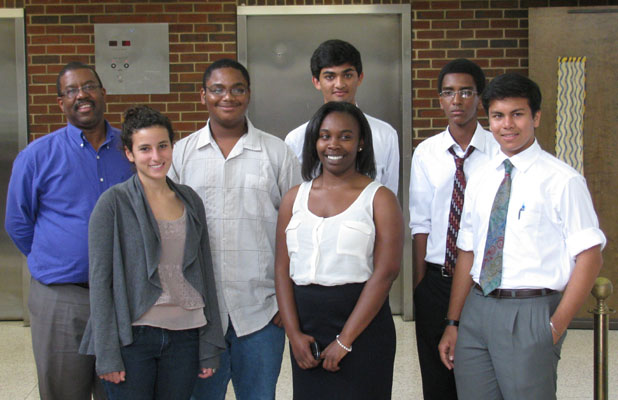 |
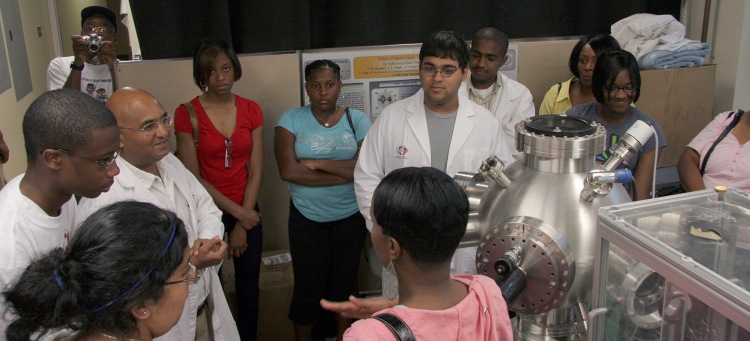 |
|
HIGH
SCHOOL STUDENTS SPEND SIX WEEKS AS
BIOENGINEERING RESEARCHERS
|
|
|
High
school students see the pulsed laser deposition
|
|
North Carolina A&T State University was selected
as a host institution for Brazilian students
participating in the Brazil Science without
Borders program. The U.S. State Department
reports that last year, President Obama and
Brazilian President Rousseff, “set complementary
goals for international education. President
Obama announced the “100,000 Strong for the
Americas” initiative to increase international
study with a target of 100,000 students from
Latin America and the Caribbean studying [in
the] United States, and a reciprocal 100,000
students from the United States studying in the
Latin American and the Caribbean region.” |
 [
Former UNC] President Molly Broad,
.... shared that by 2020, 70 percent of the
World's Scientist will live and work in Asia,
unless the country does some different kinds of
things. She said that
North
Carolina A&T is in a position to educated and
graduate world-class scientists because of
initiatives underway within our science and
technology areas, and now is the time for the
university to step up to the plate to meet the
challenges ahead",
said Dr. Speight-Buford, NC A&T Fourth Regular
Board of Trustees meeting April 20, 2005. Univ.
Nebraska Photo [
Former UNC] President Molly Broad,
.... shared that by 2020, 70 percent of the
World's Scientist will live and work in Asia,
unless the country does some different kinds of
things. She said that
North
Carolina A&T is in a position to educated and
graduate world-class scientists because of
initiatives underway within our science and
technology areas, and now is the time for the
university to step up to the plate to meet the
challenges ahead",
said Dr. Speight-Buford, NC A&T Fourth Regular
Board of Trustees meeting April 20, 2005. Univ.
Nebraska Photo |
|
|
|
"Almost
all of the occupations which will be affected by nanotechnology
will require a BS in engineering with a broad, interdisciplinary
and multi-disciplinary approach, and an understanding not only
of electrical, mechanical
and civil engineering,
but biology, physics and chemistry as well ". |
|
Liberal Arts University of North Carolina at
Greensboro offers Doctoral degrees in English,
Psychology, Education, Nutrition, Human
Development and Family Studies, Exercise and
Sport Science, and Music none of which
constitute an under standing of electrical,
mechanical, and civil engineering. |
In 2006 in the category of Doctorial
Granting Universities NC A&T was rated
as a High Research University in the
Carnegie Foundation classification of
colleges and universities.
NC A&T
the largest producers of BS. and PhD
minority engineers in the country,
offers approved master's degrees in
Civil
|
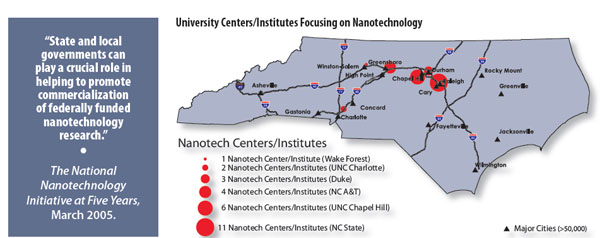 |
|
University Centers/Institutes Focusing
on Nanotechnology, A Roadmap for
Nanotechnology in North Carolina’s 21st
Century Economy, APRIL 2006, NC Board of
Science & Technology |
|
|
Engineering, Chemistry, Biology,
Industrial Systems & Systems Engineering,
Electrical Engineering, Mechanical Engineering,
Computer Science, Chemical Engineering, Physics,
Computational Science and Engineering, as well
as doctoral degrees in Energy and Environmental
Systems Engineering, computational Science and
Engineering, Electrical Engineering, Mechanical
Engineering, and Industrial and Systems
Engineering. "NC
A&T has a 12-year history in Nano research and
has been funded at a rate of $3 to $5 million
per year".* |
|
 |
|
PCG/UNC-NCCCS/UNC Interim report
3.doc/RB.SP.PC.CR.ATPCC.1/CC.14/10May05 Page 34 |
 |
|
UNCG 2006-07
Academic Profile Source : www. UNCG. edu |
 |
|
Southern
Association of Colleges and Schools (NC A&T) |
|
|
Nano scale Technologies are Experimental
|
|
In 2011 HMI North
Carolina A&T for the 7th consecutive year
garnered the third largest highest amount of
sponsored research in 17 constituent UNC system
surpassed only by UNC flag ships UNC-Chapel Hill
and NC A&T holds patents in Advanced Materials,
Nanotechnology, |
Biotechnology, Computational Science,
Environmental Sciences, Transportation Systems,
and Public Health, for seventh consecutive
year achieved the third highest research
funding in the 16-constituent University of
North Carolina System with over $60 million
dollars.
|
North Carolina A&T Nano Centers |
-
Center for Advanced Materials and
Smart Structures
-
Center for Nanoscale
Chemical-Electrical-Mechanical
Manufacturing Systems
-
Engineering Research Center for
Revolutionalizing Metallic
Biomaterials
-
Center for Nanoscience and
Nanomaterials
|
|
UNC at Greensboro Nanoscience Centers |
-
Center of Research Excellence in
Nanobiosciences
Source: North Carolina Board of
Science and Technology |
|
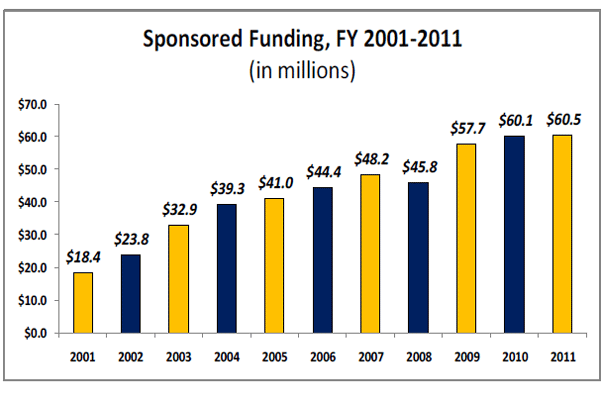 |
|
NC
A&T Sponsored Research 2001 - 2011
|
|
|
NCA&T State University has been funded
at an average rate of $3-5 million per
year in the area of nanoscience and
nanotechnology. Most of the research in
nanoengineering is done in the Center
for Advanced Materials and Smart
Structures (CAMSS). Several Centers and
projects are under CAMSS, including the
NSF Center for Research Excellence in
Science and Technology (CREST), the DoD
Center for Nanoscience, Nanomaterials
and Multifunctional Materials (CNN) for
Homeland Security, the NSF Nanoscale
Science and Engineering Center (NSEC),
the NSF project on US/Europe Materials
Collaboration: Self-Organized
Nanostructured Thin Films for Catalysis,
the NSF project on Nanoscale
Interdisciplinary Research Teams (NIRT),
the NSF Major Research Instrumentation
for Nanoengineering Research, and the
NSF Nanotechnology Undergraduate
Education (NUE) program. CAMSS also
facilitates many of the materials
research activities of the NASA-National
Institute for Aerospace (NIA). In
addition, the Center for Composite
Materials Research (CCMR) does research
in nano-enhanced composite materials and
the Army Center of Excellence for
Battlefield Capability Enhancements
(Flexible Displays) does research in
material characterization and
development of novel displays. [ ] |
|
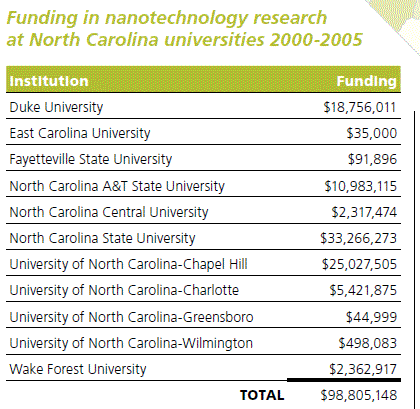 |
|
|
UNC Board of Governors November 2009 and Jan.
2010 authorized M.S. and PhD Nanoscience degrees
at HWI UNC at Greensboro requiring Nanoscience
students be given the opportunity to take
courses at the School of Engineering at HBI
North Carolina A&T University ( NCA&T) and be
able to work on collaborative projects with
faculty in the School of Engineering .
|
 |
|
Alleged UNCG Revised MS Nanoscience Request |
|
|
| "When
almost all of the occupations which will be affected by
nanotechnology will require a BS in engineering with a broad,
interdisciplinary and multi-disciplinary approach; require an
understanding not only of electrical, mechanical and civil
engineering, but biology, physics and chemistry as well." [5].
and Liberal Arts UNCG is not and engineering school,
Nanoscience students must be given the opportunity to take
courses at the School of Engineering at HBI North Carolina A&T
University ( NCA&T) and be able to work on collaborative
projects with faculty in the School of Engineering.
"NC A&T has a
12-year history in nanoresearch and two centers of excellence
for nanotechnology and nanoscience degrees at UNC at Greensboro
are an unnecessary
duplication. |
|